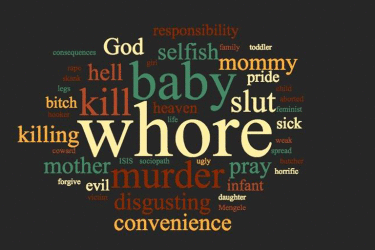Anti-Choice Threats Send #ShoutYourAbortion Founder Into Hiding (Updated)
The #ShoutYourAbortion hashtag seemed to strike a nerve with the Twitter users who heaped scorn and harassment on women who shared their stories.

UPDATE, October 2, 1:00 p.m.: Amelia Bonow responded to the LA Times story in a Facebook post that was reprinted at The Stranger.
“I have not received any acute, seemingly credible threats,” Bonow wrote. “And while all the facts in this article are correct, the overall tone is sensational.” Bonow said that while she did leave because she felt “spooked” in her Seattle apartment due to the harassment and her address being published, her leaving was a choice to avoid her “own fear” rather than a “credible threat.”
“I really reject being cast as the center of all this, or being cast as braver than any woman who has chosen to speak out about their abortion since this all began,” Bonow continued. “This movement is a sea change. It is hundreds of thousands of voices. … The only reason this thing sort of started with me is that i do not really give a fuck, which is not an implicitly righteous ethos. That initial post was just my usual not giving a fuck, and then we all decided to link arms and walk into a culture war together.”
The founder of the #ShoutYourAbortion hashtag has gone into hiding as a result of anti-choice threats and harassment, the Los Angeles Times reports.
The hashtag began with a Facebook post from Seattle-based Amelia Bonow, who was inspired to write about her abortion after the U.S. House voted on September 18 to defund Planned Parenthood.
Bonow wrote in that post that she felt an “inexpressible level of gratitude” for her experience at a Planned Parenthood clinic. But the anti-Planned Parenthood narrative depends on shame and stigma, she said—on women feeling like “abortion is still something to be whispered about.”
Bonow signed off with #ShoutYourAbortion, and after some signal boosting from her friend Lindy West, the hashtag took off. Responses flooded in from women who had had abortions and people who supported their choice—but also from Twitter users who made death threats and published Bonow’s address.
The threats and harassment made Bonow and her boyfriend feel so unsafe that they went to a hotel, then left Seattle and came back, then left again. They finally got connected to the police and FBI through their local Planned Parenthood’s security official, and they hope to assess the threat level and come home soon.
Women’s safety is regularly threatened by online abuse, and law enforcement doesn’t always know how to handle it. Several women who work in the video game industry left their homes last year after relentless harassment from anti-feminist Gamergate supporters.
Reproductive rights advocates are concerned about a surge in violence targeted at abortion clinics that may be inspired by deceptive videos attacking Planned Parenthood.
It might come as no surprise, then, that the #ShoutYourAbortion hashtag seems to have struck a nerve with the Twitter users who heaped scorn and harassment on women who shared their stories.
“Intimidating people into shutting up about their experiences accessing health care, to the point of driving them from their home, is simply unacceptable, and shouldn’t be tolerated by the part of the pro-life movement that supposedly cares so much about women’s health and safety,” Robyn Swirling, a reproductive rights activist in Washington, D.C., told Rewire.
Swirling wrote about being inundated with harassment by anti-choice Twitter users after she tweeted about her abortion on the #ShoutYourAbortion hashtag.
Tired of seeing “the same go-to violent misogynistic insults every time,” Swirling made a word cloud of the responses she got in a 24-hour period:
“Over and over again, these harassers called me a whore,” Swirling wrote. “Overall, I received one tweet from a woman who begged me to repent and said she’d pray for me, and the rest were filled with profanity and misogyny. And that’s how it works, isn’t it? When push comes to shove, there’s no real concern for children’s lives, or for women’s safety.”
A growing number of women are speaking out about their abortions to fight the stigma, and Swirling still does so regularly. But these latest threats against Bonow have a “chilling effect” on this kind of activism, Swirling said.
“Having received some very detailed and disturbing threats after sharing my abortion story publicly, I’m now much more cautious about where I share my story, what details I include, or even what methods I use to communicate my contact information to people,” Swirling said.

